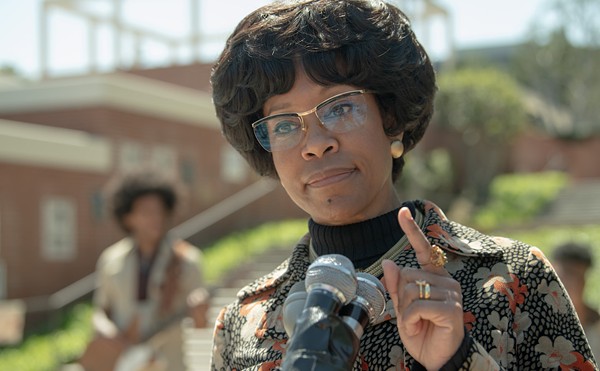Linklater — who, along with Steven Soderbergh and Gus Van Sant, has staked out a particular outpost on the indie-studio border — here takes a cleaver to the great American hamburger. One might wish that his movie had honed its satiric edge. Still, as blunt as Fast Food Nation is, it's also a surprising piece of social criticism to emerge (like Borat) from the status-quo folks at Fox.
Timed for the centennial of Upton Sinclair's classic muckraker The Jungle, as well as Thanksgiving, Fast Food Nation opens with a slow zoom into the fresh-charred heart of a greasy, gristle-flecked beef patty. The thing looks disgusting long before it's established that any individual burger is the ground residue of many, many messily butchered animals (plus their hormones and the contents of their intestines), given a dollop of extra fat, injected with chemical perfume, and possibly dipped in floor dirt or garnished with an employee's loogie.
So much for the micro: Linklater is actually after bigger game. He uses the scarcely fictionalized Mickey's franchise ("Home of the Big One") as a metaphor for American life. A cheerful Mickey's marketer (Greg Kinnear) learns that for all the engineered slogans, scientific packaging and artificial aromas, lab tests show that "there's shit in the meat." His investigatory mission to the mega-packing plant in Colorado intersects with the stories of the Mexican illegal immigrants who work there, as well as that of a Mickey's register girl (former child actress Ashley Johnson) turned eco-activist.
A more materialist (and successful) ensemble film than the mystical Babel, in that everyone is connected through the same economic system, Fast Food Nation is exotic for being a movie about work. Its characters struggle with some of the world's dirtiest jobs — morally as well as physically. In this, Linklater is following in the Sinclair tradition: The Jungle, which also focused on immigrant workers, was intended not so much as an attack on the meat-packing industry as a socialist jeremiad against capitalism itself.
Linklater's panorama is overflowing with good intentions, and it's graphic enough to put you off beef, even before reaching the plant "killing floor." The movie is valiant, if curiously anemic. Its most galvanizing scene effectively undermines the argument: Bruce Willis has a lip-smacking cameo as the voice of cynical realism — a Mickey's operative who mocks American 'fraidy cats and shocks Kinnear with the smirking assertion that "we all have to eat a little shit from time to time."
The next morning Kinnear leaves his hotel, disillusioned with the plastic people of the service industry — and pointedly vanishes from the movie. (This may be as much strategic as thematic; Kinnear's awakening is difficult to take seriously mainly because sincerity is beyond his register.) The other featured stars are predictably liberal. Kris Kristofferson has a scene as a righteous cattle rancher threatened by unscrupulous developers. The movie stops dead so that he can give Kinnear a little history of the meat industry's price-fixing and political influence. He laughs at the idea of a clean burger and offers what amounts to the movie's political worldview: "The machine has taken over this country... like something out of science fiction." Later, Ethan Hawke ambles on set as a happy hippy, a cabinet-maker who argues unconvincingly for the nonconformist life.
There's a hopeless sense that McDonald's "R" Us: After two months in the States, one Mexican couple saves enough money to treat themselves to a food franchise dinner. It's one of the wonders of America: "Next week, we'll try pizza." (Later, the coyote who managed their border-crossing will welcome two kids to America with a bag of Mickey Bits.) Linklater provides his own auto-critique when a frustrated cadre of student environmentalists attempt to liberate a pasture — or "prison camp" — filled with contented cows. The animals won't budge. "We should have brought a cattle prod," one kid concludes.
Something worse than a prison camp for cows, the slaughterhouse is rife with exploitation and danger. This is where Linklater finds his melodrama, following the fate of three Mexican illegals — fresh meat for the machine. The most painfully naïve is played by Catalina Sandino Moreno, the open-faced Colombian actress Oscar-nominated for her role in Maria Full of Grace; her character here deserves the same sobriquet. The despoliation of Moreno's grave, clear-eyed child of nature is the movie's emotional crux. Her season in hell is the real thing — sentenced to the killing floor, pulling kidneys amid torrents of blood, her comradely gaze clouded with ammonia tears.
That this horrific sequence was actually (and perhaps necessarily) shot in a Mexican meat plant doesn't exactly contradict Linklater's polemic that we are what we eat, but it does complicate things.





